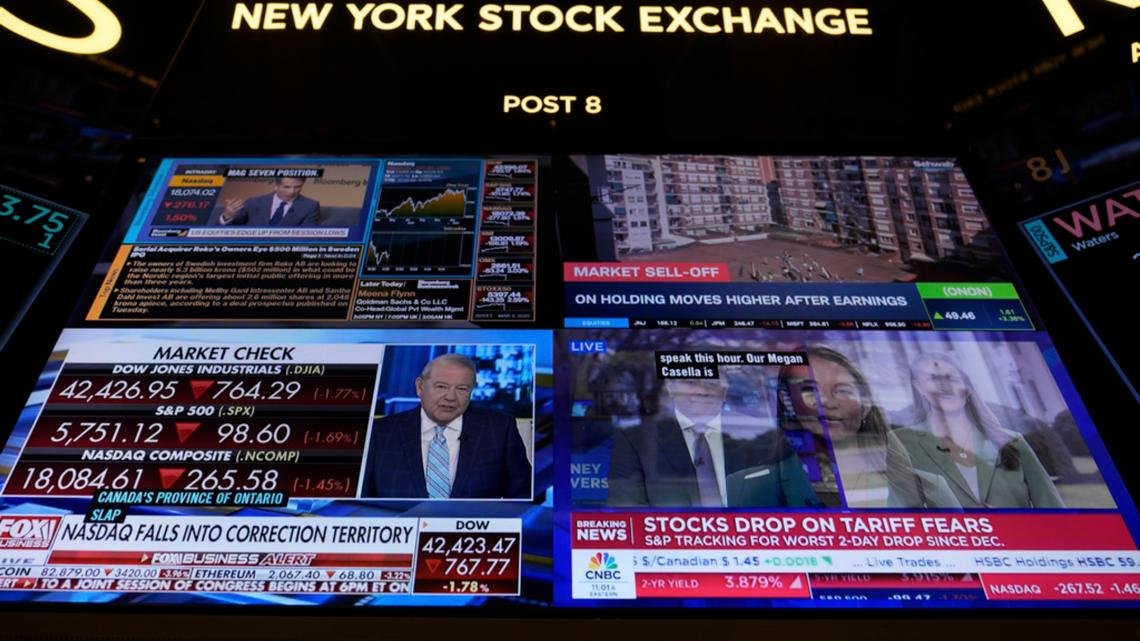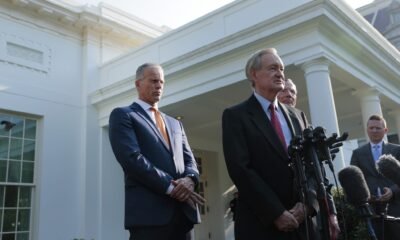Business
Dow Plummets 950, Wall Street Faces Its Darkest Day in Years Amid Economic Fears

NEW YORK — The U.S. stock market experienced a significant downturn on Monday, with heightened concerns over the economic implications of President Donald Trump’s tariff policies. Wall Street is grappling with uncertainty regarding the potential impact on consumer confidence and overall economic health.
The S&P 500 dropped 3% during late trading, marking its steepest decline since inflation surged in 2022. The Dow Jones Industrial Average fell 956 points, or 2.2%, while the Nasdaq composite saw a 4.3% drop. These fluctuations indicate the market’s volatility, driven largely by ongoing tariff discussions.
Investors are particularly anxious about how Trump’s tariffs may directly harm the economy or create a climate of uncertainty that inhibits consumer and corporate spending. After peaking on February 19, the S&P 500 is currently down about 9% from its all-time high.
Recent economic signals suggest a downturn may already be underway, with increasing pessimism reflected in surveys and a collection of real-time indicators from the Federal Reserve Bank of Atlanta indicating possible economic contraction.
During a weekend interview, Trump was hesitant to predict an impending recession, emphasizing the transition phase of his economic policies aimed at revitalizing American manufacturing. His administration is limiting federal spending while trying to curb the federal workforce and increase deportations, moves that may negatively affect job growth.
Despite these challenges, the labor market remains stable, and economic growth at the end of the previous year was solid. However, economists are adjusting their growth forecasts. Goldman Sachs analyst David Mericle downgraded projections for U.S. economic growth for 2025 from 2.2% to 1.7%, citing expectations of increased tariff impacts.
The chance of a recession within the next year is estimated at one in five, a slight increase attributed to the administration’s potential policy adjustments should economic conditions worsen.
Chris Larkin of E-Trade noted that tariffs currently overshadow other market influences. Big tech companies, which had previously soared, are feeling the pinch the hardest. For instance, Nvidia’s stock fell by 5.9%, making for a 21% loss this year alone after experiencing an 820% surge in previous years.
Elon Musk’s Tesla saw a severe decline of 15.1%, pushing its losses for the year to nearly 45%. Initial post-election optimism tied to Musk’s connections with Trump has dissipated, overshadowed by growing concerns associated with the electric vehicle manufacturer’s brand becoming intertwined with Trump’s controversial policies.
Companies reliant on consumer spending also took substantial hits, with United Airlines dropping 8.4% and cruise operator Carnival sliding by 9.2%. Broader investment trends show that even cryptocurrencies, once seen as unstoppable, are facing challenges as Bitcoin’s value fell to below $79,000 from over $106,000 in December.
In search of stability amid market turbulence, investors are flocking to U.S. Treasury bonds, driving prices up and yields down. The yield on the 10-year Treasury has decreased to 4.21%, dropping from near 4.80% earlier this year as economic worries mount.
Despite the turbulent environment, some businesses are still brokering deals. Redfin’s stock surged 64.7% after Rocket announced plans to acquire the digital real estate platform for $1.75 billion in an all-stock deal. However, Rocket’s stock dipped by 17.2% in response. Additionally, ServiceNow’s shares fell 7.9% as it disclosed plans to acquire Moveworks for $2.85 billion.
Internationally, stock markets mirrored the U.S. trend, with European indexes primarily in decline. In Asia, Hong Kong experienced a 1.8% drop, while Shanghai fell 0.2% following reports of a decline in Chinese consumer prices, highlighting ongoing economic challenges for China amid weak demand.














![Members of the Arizona House of Representatives vote during a third reading of nearly three dozen bills at the Arizona State Capitol on March 4, 2025. [Monica D. Spencer]](https://arizonanews.org/wp-content/uploads/2025/06/SR-347-Secures-53M-in-Third-State-Budget-Draft-Awaiting-80x80.jpg)



